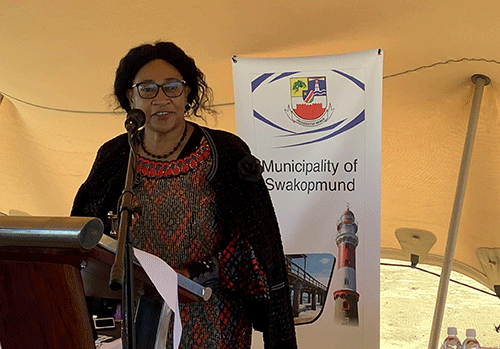RUNDU – Local and regional councillors as well as administrators have been asked to work in coherence to ensure effective resolutions are made and implemented successfully.
The urban and rural development ministry held its fourth session on the hiring and firing of heads and administrators of regional and local authority councils on Monday in Rundu.
The ministry has so far engaged Kunene, Otjozondjupa, Omaheke and Erongo regions.
“We need to reflect on how we should handle issues of appointments, suspensions, and renewal of employment contracts of the accounting officers of subnational governments in accordance with the relevant legislation such as the Regional Council Authority Act of 1992, as amended, and the Local Authority Act of 1992, as amended,” said the deputy minister Natalia /Goagoses.
/Goagoses told councillors the public is aware and watching to see if certain institutions are purposefully suspending administrative heads for political or personal reasons.
In the same vein, she said the public is aware of administrators who are deliberately sabotaging their councillors’ resolutions.
“It is necessary for us to candidly reflect and focus on the pressing national and local government issues and share ideas on the challenges and best practices in handling situations,’’ she said.
“Let’s be cognisant of the root causes of this unfavourable situation and how we can improve it,’’ she added.
In the ministry’s past sessions, the concept of interference and intervention was elaborated on, meaning that councillors may not interfere in the day-to-day operations of the council but may intervene. Another root cause identified was the distinction between the roles or aspirations of individuals and the public interest. “It was mentioned that administrators were colluding with councillors and acting as politicians and vice versa. It is also our hope to encourage a culture of good governance, and teamwork and strengthen good communication principles as stipulated in our code of conduct for elected office bearers, clearly defining the line of command between councillors, staff and the community,’’/Goagoses noted.
She noted that as a collective, technocrats and councillors are responsible for ensuring service delivery, but cannot ignore the unprecedented culture of institutions operating without administrative heads.
The ministry has the responsibility to ensure that all councillors and administrative heads are oriented toward their new role when they assume duties. The ministry conducts nationwide training inductions to capacitate newly elected regional and local authority councillors together with their senior administrative staff members. We continue to provide ad hoc training when a need is identified or upon requests from various regional councils or local authorities, said the deputy minister.
“These efforts are to standardise service delivery. As you may all recall, the induction covers various critical areas pertaining to regional and local government operations, administration, and governance aimed at equipping you with the basic information and skills to be able to run your councils effectively and efficiently,” she said.
According to /Goagoses, all these efforts are aimed at ensuring that office bearers understand governance, service delivery, and most importantly, financial prudence. “I always encourage sub-national governments to aim for unqualified audit reports.”
“If Natalia and her team can do it, you too can do it. We at the ministry also share your quest to make regional and local government more people-centred and more responsive to the developmental and knowledge-based challenges of the day,” she noted.
– jmuyamba@nepc.com.na


